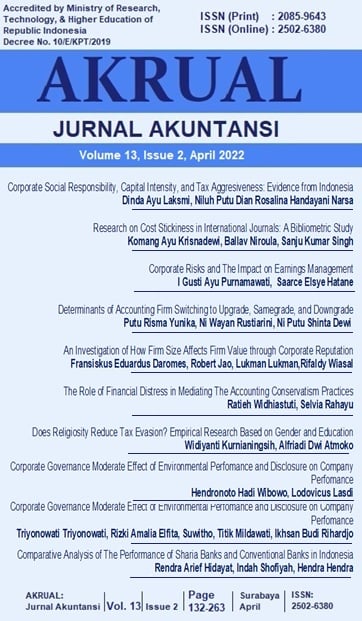Ownership Concentration and Earning Quality: Moderating Role of Board Diversity
DOI:
https://doi.org/10.26740/jaj.v13n2.p240-250Abstract
Bad management practices that occur in the industry cause a lot of harm to many parties. Bad management practices occur due to managers' efforts to manipulate profits. Bad management practices that are carried out by management will be aggravated if the majority of shareholders participate to press the managers to make a profit manipulation so the earning quality becomes low. The purpose of this research is to find out how ownership concentration affects earnings quality and to determine the ability of directors to reduce the influence of ownership concentration on income quality. The research data used is a manufacturing company registered with the IDX in 2019-2020 with sampling methods using the target population method, that is, a sample determination technique using certain considerations. The data analysis method used is Moderated Regression Analysis (MRA). The results proved that the ownership concentration negatively affects the earning quality and board diversity can moderate the influence of ownership concentration on earning quality. Test results show that Board Diversity can reduce the behavior of Ownership Concentration in performing earnings manipulation
References
Asyik, N. F. (2017). Dampak Struktur Modal Pada Sensitivitas Penerapan Kompensasi Opsi Saham Karyawan Terhadap Kinerja. EKUITAS (Jurnal Ekonomi Dan Keuangan), 14(1), 1. https://doi.org/10.24034/j25485024.y2010.v14.i1.2109
Blau, P. M. (1977). Inequality and Heterogeneity: A Primitive Theorie of Social Structure. 58(2), 307.
Dewi, G. K. (2017). PENGARUH DIVERSITAS DEWAN KOMISARIS DAN DIREKSI PADA TAX AVOIDANCE. E-Jurnal Akuntansi; Vol 18 No 1 (2017). https://ojs.unud.ac.id/index.php/Akuntansi/article/view/26202
Fernando, Y., & Wulansari, P. (2020). Perceived understanding of supply chain integration, communication and teamwork competency in the global manufacturing companies. European Journal of Management and Business Economics, ahead-of-p(ahead-of-print). https://doi.org/10.1108/ejmbe-06-2020-0157
Foroughi, M., & Fooladi, M. (2011). Corporate Ownership Structure and Firm Performance: Evidence from Listed Firms in Iran. CGN: Shareholders in Corporate Governance (Topic).
Jensen, M. and W. M. (1976). Theory of The Firm: Managerial Behavior, Agency Costs, And Ownership Structure. Journal of Financial Economics, 3.
Sugiyono. (2011). Metode Penelitian Kuantitatif, Kualitatif dan R&D. Bandung: Afabeta.
Downloads
Published
How to Cite
Issue
Section
License
Copyright (c) 2022 Triyonowati Triyonowati, Rizki Amalia Elfita, Suwitho Suwitho, Titik Mildawati, Ikhsan Budi Rihardjo

This work is licensed under a Creative Commons Attribution-NonCommercial 4.0 International License.
 Abstract views: 815
,
Abstract views: 815
, PDF Downloads: 910
PDF Downloads: 910


















